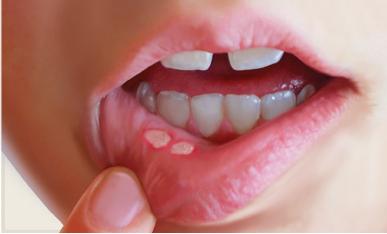Aphthous Ulcers and
Canker Sores in the Mouth
Updated 2023. What are aphthous ulcers and canker sores?
They are the same thing! In some countries these mouth ulcers are called canker sores in the mouth. Generally, the correct medical term is "aphthous ulcer", and "canker sores in the mouth" is what patients call them.
They are not contagious, so you don't have to worry about spreading them to other people in any way. However, they can be very painful, and can interfere with eating and speaking, depending on where they are situated.

Canker sores in the mouth are:
- like tiny craters inside your cheeks and lips, roof of your mouth, and sometimes in your throat.
- all different sizes; the bigger they are, the longer they take to heal up.
- caused by a number of different conditions.
- more frequent in men than women.
Aphthous ulcers and canker sores in the mouth
Aphthous ulcers or "canker sores" in the mouth are very common indeed. About 20% of the general population get them at one time or another. Canker sores can also be known as aphthous stomatitis. This is just a medical term that means an inflamed mouth due to ulcers!
The tendency to get mouth ulcers appears to have a genetic origin - that means that getting mouth ulcers seems to run in families. If mom or dad tend to suffer from mouth ulcers, the chances are that their kids will, too. Some people are just more prone to getting these ulcers than others.
The size of the mouth ulcer depends on the type of ulcer.
- Minor aphthous ulcers have a diameter of 1mm to 10mm. These are the most common ulcers, and usually last about 7-10 days. Of all mouth ulcers, around 80% can be classified as "minor". Although the ulcers may be small in size, you can get anything from one to twenty of them, which is very uncomfortable.
- Major aphthae (the correct word for more than one ulcer!) have a diameter of more than 10mm, and they can take a lot longer to heal up than minor aphthae, sometimes lasting up to 30 days. Sometimes, they can leave a small scar behind. Fortunately, only 10% of all ulcers are classified as major. Another plus point is, you only tend to get one at a time!
- Herpetiform ulcers account for the remaining fraction of all mouth ulcers. They look like a collection of tiny individual ulcers, each less than 2 millimeters across. It takes around 8 to 12 days for herpetiform mouth ulcers to go away. They are called herpetiform because they can look like a Herpes Simplex infection.
What are the symptoms of aphthous ulcers?
Aphthous ulcers in the mouth usually crop up inside the cheeks or inside the lips. However, they can also appear almost anywhere inside the mouth and throat.
The ulcers begin as tiny red swellings (like tiny blisters) that usually burst within a day or two. The resulting sores are covered by a thin layer of white or yellow tissue, and usually have a red halo around them.
On average, the ulcers heal within two weeks without treatment, and without scarring. It's unusual to get a high temperature, and mouth ulcers do not generally have anything to do with any other medical condition.
Most people experience their first canker sores in the mouth between the ages of 10 and 20. But it is possible to get them at any age. How often you get canker sores varies considerably. Some lucky people only get them once or twice in a year. Other less fortunate folk can get an almost non-stop run of canker sores. As soon as one area heals up, another area breaks out.
What are the causes of mouth ulcers?
Aphthous Ulcers or Canker sores are a result of either, stress, anxiety, a poor diet, a vitamin deficiency, a food allergy, smoking, just to mention a few.
Recent research has also shown a link between aphthous ulcers and a particular ingredient in just about EVERY toothpaste on the market.
It's called Sodium Lauryl Sulfate, and it's added to toothpastes to make them foam up a bit. But in some people it can trigger ulcers or canker sores.
The BEST toothpaste that does NOT contain Sodium Lauryl Sulfate is from TheraBreath. I recommend the standard TheraBreath toothpaste. This should help to PREVENT the ulcers from developing in the first place, if you are one of those people who are sensitive to Sodium Lauryl Sulfate.
Canker sores do not appear to be caused by a virus or bacteria. However, it is possible that some folk have a type of allergic reaction to a particular bacteria in their mouth.
What treatments are there for mouth ulcers?
You can use one of the following remedies: Benzocaine, Oragel, Lidocaine, or Debacterol. Another very good drug is Triamcinolone dental paste 1%, also known as Kenalog in Orabase. This is a granular paste with pectin in it that allows the ointment to stay in place even in the presence of saliva! Use it sparingly about 3 to 4 times a day. You will need to get a prescription for the Kenalog if you need it. Just call your dentist and he can call it in for you.
There is also a rinse called Rincinol P.R.N. that helps promote healing which is available over-the-counter.
Peroxyl mouthwash may help too; https://www.colgateprofessional.com/products/products-list/rinse-specialty/colgate-peroxyl-mouth-sore-rinse.
Vitamin B complex and Folic Acid have also been shown to be effective in reducing canker sores. It will take at least 7-10 days for total healing to occur.
If these aphthous ulcers become regular, you should see your doctor for some blood tests - the most common cause is a vitamin B12 deficiency. The next most common is using a toothpaste containing Sodium Lauryl Sulfate (SLS); look for a SLS-free toothpaste. This may help.
Also, take a look at my mouth ulcer treatment page, which tells you about some other things you can do at home.
Although aphthous ulcers can be very painful, they heal up on their own and normally don't cause any problems. However, as always, if you have canker sores in the mouth that don't heal within 10 - 14 days, get your dentist to check it out!
Updated June 2023.



